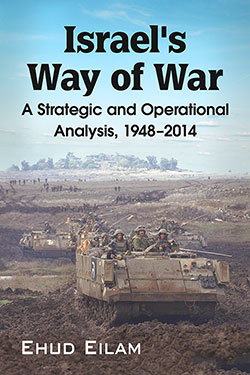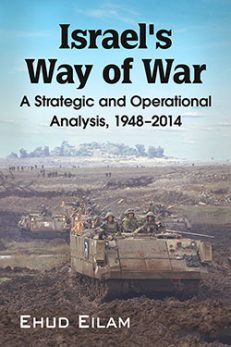Israel’s Way of War
A Strategic and Operational Analysis, 1948–2014
$29.95
In stock
About the Book
Israel has fought many wars since its founding in 1948, from conventional military conflicts with Arab forces to irregular clashes with guerrilla and terror groups. A study of these confrontations reveals strategic and military patterns. Written by a former member of the Israel Defense Forces, this book compares the wars fought in Lebanon against the Palestine Liberation Organization (1982) and against Hezbollah (2006), and in the Gaza Strip (1956, 1967, 2008–2009 and 2014). The author draws similarities between Israel and Western nations—mainly the United States and Britain—in their waging of conventional and irregular warfare, and offers a comparison of the Vietnam War to Israel’s struggle with Hezbollah in the 1990s.
About the Author(s)
Bibliographic Details
Ehud Eilam
Format: softcover (6 x 9)
Pages: 208
Bibliographic Info: 14 photos, 3 maps, notes, bibliography, index
Copyright Date: 2016
pISBN: 978-1-4766-6382-1
eISBN: 978-1-4766-2325-2
Imprint: McFarland
Table of Contents
Table of Contents
Preface 1
Introduction 3
1. Israel’s National Strategy and Its High-Intensity Wars 11
2. Israel’s Combat Doctrine in a High-Intensity War 32
3. The Strategic Linkage Between Israel’s High-Intensity, Hybrid and Low-Intensity Wars 48
4. The IDF in Fighting Low–and High-Intensity Wars 71
5. Fire in the Backyard: Israel’s Campaigns in the Gaza Strip in 1956, 1967, 2008–2009 and 2014 102
6. Fighting Hybrid Adversaries: Israel Versus the PLO in 1982 and the Hezbollah in 2006 111
7. Israel’s Military Strategy and Doctrine and Its Resemblance to Western States 121
8. The U.S.-Vietnam War and the Israeli-Hezbollah War in the 1990s 142
9. The High–and Low-Intensity War in Libya in 2011 151
Conclusion 167
Chapter Notes 181
Bibliography 196
Index 201
Book Reviews & Awards
“this book is a masterpiece…it is required reading for all students of international relations and security studies”—Research Institute for European and American Studies; “an expert account”—Perspectives on Terrorism.






